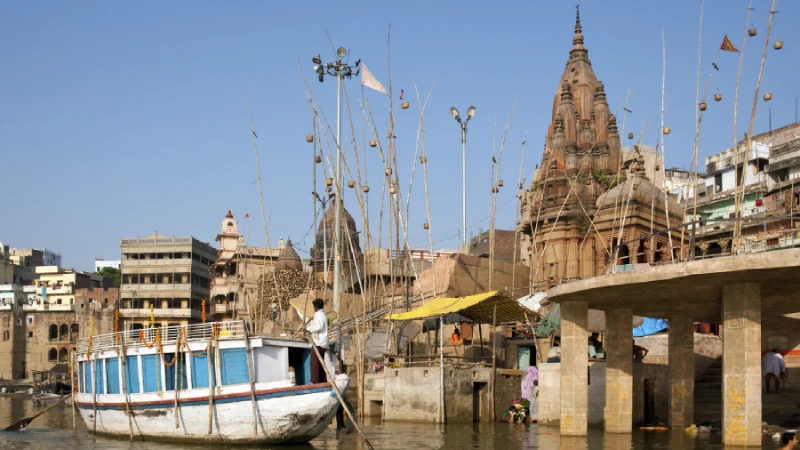The Kashi Vishwanath Temple is one of the most sacred and revered temples in India. Located in the heart of Varanasi, this temple is dedicated to Lord Shiva, who is worshipped here as Vishwanath (the Lord of the Universe). For centuries, pilgrims and devotees have flocked to this temple to seek blessings and attain moksha (liberation from the cycle of birth and death). In this guide, we’ll explore the history, significance, timings, and tips for visiting the Kashi Vishwanath Temple, ensuring you have a meaningful and hassle-free experience.
Why Kashi Vishwanath Temple is Special
The Kashi Vishwanath Temple holds a unique place in Hinduism. It is believed that a visit to this temple and a dip in the holy Ganges can grant liberation from the cycle of rebirth. The temple’s spiritual energy, combined with its rich history and stunning architecture, makes it a must-visit destination in Varanasi.
History and Significance of Kashi Vishwanath Temple
Ancient Origins
The Kashi Vishwanath Temple has a history that dates back thousands of years. It is mentioned in ancient Hindu scriptures like the Puranas and Mahabharata. The temple has been destroyed and rebuilt several times due to invasions, but its spiritual significance has remained unchanged.
Architectural Marvel
The current structure of the temple was built in 1780 by Queen Ahilyabai Holkar of Indore. The temple’s golden spire (shikhar) is a striking feature that can be seen from a distance. The intricate carvings and designs on the temple walls reflect the grandeur of Indian architecture.
Spiritual Significance
- The temple is one of the 12 Jyotirlingas, which are considered the most sacred abodes of Lord Shiva.
- It is believed that Lord Shiva himself resides in the temple, making it a powerful place for spiritual seekers.
- A visit to the temple is said to fulfill the wishes of devotees and bring peace and prosperity.
What to See Inside the Temple
The Main Shrine
The main shrine houses the Jyotirlinga, a symbolic representation of Lord Shiva. Devotees offer water, milk, and flowers to the lingam as a mark of devotion.
The Gyanvapi Well
Located within the temple complex, the Gyanvapi Well is believed to be the original site of the ancient temple. The well is considered sacred, and its water is said to have healing properties.
The Golden Spire
The temple’s golden spire is one of its most iconic features. It is made of pure gold and stands as a symbol of the temple’s grandeur and spiritual significance.
Timings and Entry Details
Temple Timings
The Kashi Vishwanath Temple is open every day, but the timings vary depending on the season and rituals. Here’s a general schedule:
- Morning: 3:00 AM to 11:00 AM
- Afternoon: 12:00 PM to 7:00 PM
- Evening: 8:30 PM to 9:00 PM
Note: The temple may close for a few hours in the afternoon for special rituals.
Aarti Timings
The temple conducts several aarti ceremonies throughout the day. The most popular ones are:
- Mangala Aarti: 3:00 AM to 4:00 AM (early morning)
- Bhoga Aarti: 11:30 AM to 12:00 PM (midday)
- Sapta Rishi Aarti: 7:00 PM to 8:15 PM (evening)
- Shringara Aarti: 9:00 PM to 10:15 PM (night)
Entry Fee
There is no entry fee to visit the temple, but special passes are available for faster access during peak hours.
Tips for Visiting Kashi Vishwanath Temple
Dress Modestly
The temple is a place of worship, so dress modestly. Avoid wearing shorts, sleeveless tops, or revealing clothing.
Leave Your Belongings Behind
Electronic devices, bags, and leather items are not allowed inside the temple. You can deposit them at the cloakroom near the entrance.
Be Prepared for Crowds
The temple is always crowded, especially during festivals and aarti timings. Arrive early to avoid long queues.
Respect the Rituals
Follow the temple rules and respect the rituals. Avoid taking photographs inside the temple.
Hire a Guide
If you want to learn more about the temple’s history and significance, consider hiring a local guide.
Festivals at Kashi Vishwanath Temple
Maha Shivratri
Maha Shivratri is the most important festival celebrated at the temple. Devotees fast, offer prayers, and stay awake all night to seek Lord Shiva’s blessings.
Shravan Month
The month of Shravan (July–August) is considered highly auspicious for Lord Shiva. Devotees offer water from the Ganges to the Jyotirlinga during this time.
Dev Deepawali
Celebrated 15 days after Diwali, Dev Deepawali is a grand festival where the temple and the ghats are illuminated with thousands of lamps.
Nearby Attractions
Vishwanath Gali
This narrow lane near the temple is famous for its shops selling religious items, souvenirs, and street food.
Dashashwamedh Ghat
Located just a short walk from the temple, Dashashwamedh Ghat is where the famous Ganga Aarti takes place every evening.
Gyanvapi Mosque
Adjacent to the temple, the Gyanvapi Mosque is a historical site that reflects the city’s complex past.
Final Thoughts
The Kashi Vishwanath Temple is not just a place of worship; it’s a spiritual journey that connects you to the divine. Whether you’re a devotee seeking blessings or a traveler exploring Varanasi’s heritage, the temple offers an experience that’s both profound and unforgettable. So, plan your visit, follow the tips, and immerse yourself in the spiritual energy of this sacred place.

